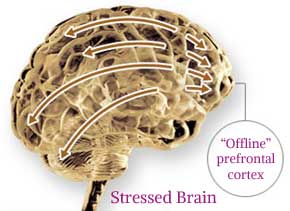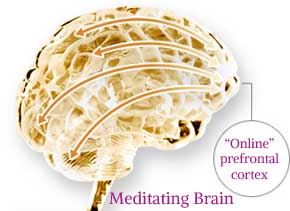Official Republic of Korea Website
Transcendental Meditation, Stress and the Brain
The Transcendental Meditation technique exercises the critical prefrontal cortex of the brain—to make the brain healthier, more integrated, and better able to function together as a whole.


How stress damages the brain
Stress, pressure, fatigue, poor diet, alcohol, and drugs damage neural connections between the brain's prefrontal cortex—or "CEO"—and the rest of the brain. When you are overtired or under intense mental or physical stress, the brain bypasses its "higher," more evolved, rational frontal executive circuits. Consequently, you respond to daily demands without thinking; you make impulsive, shortsighted decisions. When the CEO goes "offline," strong emotions, such as fear and anger, take over, adversely coloring your view of the world.
How TM optimizes the brain
The stress-reducing, nonreligious Transcendental Meditation (TM) technique provides the experience of "restful alertness," which reduces stress, strengthens communication between the brain's prefrontal cortex and different areas of the brain, and develops total brain functioning. As a result, the Transcendental Meditation practitioner displays stronger executive functions, with more purposeful thinking and farsighted decision-making. When the CEO is fully "online," the emotional response to the world is more balanced and appropriate.
Weak executive functioning
- Rigid thinking
- Impulsive, reactive behavior
- Shortsighted decision-making
- Poor working memory
- Distracted attention
- Drug and alcohol abuse
- Unethical thinking and behavior
Strong executive functioning
- Purposeful, flexible thinking
- Nonimpulsive, proactive behavior
- Farsighted decision-making
- Excellent working memory
- Settled, focused attention
- No substance abuse or addictions
- Ethical thinking and behavior
Stressed physiology
- Fatigue
- High blood pressure
- Eating and sleeping disorders
- Weak immune system
Healthy physiology
- Energy and vitality
- Fit cardiovascular system
- Balanced physiology
- Strong immune functioning
Imbalanced emotions
- Low self-esteem and self-confidence
- Worries, anxieties, and fears
- Shallow, divisive emotions
- Unstable relationships
- Depression
Balanced emotions
- Self-confidence and secure self-esteem
- Feelings of safety and peace
- Compassion and empathy for others
- Healthy interpersonal relations
- Happiness and optimism
